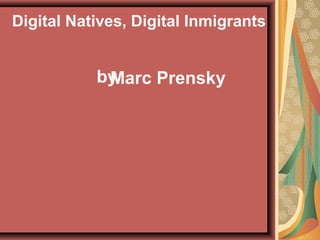
Digital Natives vs Digital immigrants
- 1. Digital Natives, Digital Inmigrants by Marc Prensky
- 2. New students N – Gen D – Gen Digital Natives “Native Speakers” of the digital language of computer, video games and the Internet.
- 3. Generations that grow up with new technology Computers Video games Video cams Digital Music players Cell phones Computer games Email The Internet Tools of the digital age
- 4. Today´s students are not longer the people our educational system was designed to teach.
- 5. Digital technology Big discontinuity Singularity Radical changes
- 6. Digital Inmigrants People who were not born into the digital world, but who are fascinated by it and who have adopted some / most aspects the new technology.
- 7. A distinction their “accent” They always retain their “digital inmigrant accent” because they are learning a new language later in life which goes into a different part of the brain.
- 8. Examples • Digital Natives • Digital immigrants • Turn to the Internet • Turn to the Internet for information in the in the second place first place • Read the manual for • A program teaches a program them how to use it • Print their emails or by using it have it print • Read emails on the • Print documents screen edit them in them • Edit documents on • Take people the screen physically to see • Send people a URL together an interesting website
- 9. Problem in educaction Digital immigrant instructors, who speak the outdated language of the pre- digital age, are struggling to teach a population that speaks an entirely ew language.
- 10. Digital Natives Think and process information differently from their predecessors Their thinking patterns ( and probably their brains ) have changed
- 11. Digital Natives - Receive information really fast - Prefer graphics before texts - Function best when networked - Prefer games to “serious” work - Have little patience for lectures, step-by-step logic - Have a library on their laptops - Used to the instantaneity of hypertext - Use instant messaging
- 12. Digital Inmigrants: tend to have little appreciation for these new skills.
- 13. To confront this issue: It is necessary to reconsider Methodology and Content In learning
- 14. Methodology Today´s teachers have to learn to communicate in the language and style of their students
- 15. Content Two kinds “Legacy” content “Future” content
- 16. “Legacy” content The “traditional” curriculum: reading, writing, arithmetic, logical thinking
- 17. “Future” content = Digital / technological content Software, hardware, robotics, genomics, etc PLUS ethics, politics, sociology, languages, etc
- 18. The result: “learning new stuff” and “learning new ways to do with old stuff”
- 19. Adapt materials to the language of Digital Natives Effort is needed Invent Digital Native methodologies for all subjects, at all levels